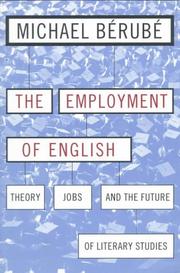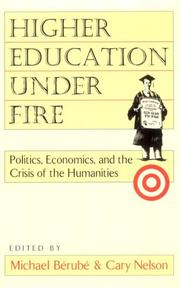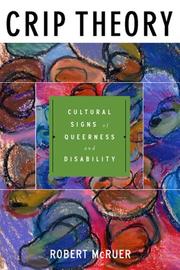Book
ISBN: 0814739059 0814799841 081479985X 1441631593 Year: 2009 Publisher: NYU Press
Abstract | Keywords | Export | Availability | Bookmark
 Loading...
Loading...Choose an application
- Reference Manager
- EndNote
- RefWorks (Direct export to RefWorks)

ISBN: 0585337772 081472342X 0814713009 0814713017 9780814723425 9780585337777 9780814713006 9780814713013 Year: 1997 Publisher: New York, NY : New York University Press,
Abstract | Keywords | Export | Availability | Bookmark
 Loading...
Loading...Choose an application
- Reference Manager
- EndNote
- RefWorks (Direct export to RefWorks)
What sorts of cultural criticism are teachers and scholars to produce, and how can that criticism be "employed" in the culture at large? In recent years, debates about the role and direction of English departments have mushroomed into a broader controversy over the public legitimacy of literary criticism. At first glance this might seem odd: few taxpayers and legislators care whether the nation's English professors are doing justice to the project of identifying the beautiful and the sublime. But in the context of the legitimation crisis in American higher education, the image of English departments has in fact played a major role in determining public attitudes toward colleges and college faculty. Similarly, the changing economic conditions of universities have prompted many English professors to rethink their relations to their "clients," asking how literary study can serve the American public. What sorts of cultural criticism are teachers and scholars to produce, and how can that criticism be "employed" in the culture at large? In The Employment of English, Michael Bérubé, one of our most eloquent and gifted critics, examines the cultural legitimacy of literary study. In witty, engaging prose, Bérubé asserts that we must situate these questions in a context in which nearly half of all college professors are part-time labor and in which English departments are torn between their traditional mission of defining movements of literary history and protocols of textual interpretation, and their newer tasks of interrogating wider systems of signification under rubrics like "gender," "hegemony," "rhetoric," "textuality" (including film and video), and "culture." Are these new roles a betrayal of the field's founding principles, in effect a short-sighted sell-out of the discipline? Do they represent little more that an attempt to shore up the status of--and student enrollments in--English? Or are they legitimate objects of literary study, in need of public support? Simultaneously investigating the economic and the intellectual ramifications of current debates, The Employment of English provides the clearest and most condensed account of this controversy to date.
English philology --- English literature --- English language --- English teachers --- Interdisciplinary approach in education. --- Language and culture --- Study and teaching --- Political aspects --- History and criticism --- Theory, etc. --- Employment --- Vocational guidance. --- Integrated curriculum --- Interdisciplinarity in education --- Interdisciplinary studies --- Germanic philology --- Curriculum planning --- Holistic education --- Language teachers --- Lerarenopleiding --- (vak)didactiek talen. --- English language -- Political aspects -- United States. --- English literature -- History and criticism -- Theory, etc. --- English philology -- Study and teaching -- Political aspects -- United States. --- English philology -- Vocational guidance. --- English teachers -- Employment -- United States. --- Language and culture -- United States. --- Literature teachers --- Germanic languages --- Culture

ISBN: 0415908051 041590806X 9781003061489 1003061486 9781000100990 1000100995 9781000143300 1000143309 9781000117943 1000117944 Year: 1995 Publisher: New York, N.Y. Routledge
Abstract | Keywords | Export | Availability | Bookmark
 Loading...
Loading...Choose an application
- Reference Manager
- EndNote
- RefWorks (Direct export to RefWorks)
Higher education --- United States --- Education, Higher --- Humanities --- College teachers --- Enseignement supérieur --- Aims and objectives --- Congresses --- Political aspects --- Study and teaching (Higher) --- Social aspects --- Finalités --- Congrès --- Enseignement supérieur --- Finalités --- Congrès --- Congresses. --- United States of America

ISBN: 081475712X 0814757138 9780814757130 9780814757123 0814759866 0814761097 1435600398 Year: 2006 Publisher: New York, N.Y. New York University Press
Abstract | Keywords | Export | Availability | Bookmark
 Loading...
Loading...Choose an application
- Reference Manager
- EndNote
- RefWorks (Direct export to RefWorks)
Crip Theory attends to the contemporary cultures of disability and queerness that are coming out all over. Both disability studies and queer theory are centrally concerned with how bodies, pleasures, and identities are represented as “normal” or as abject, but Crip Theory is the first book to analyze thoroughly the ways in which these interdisciplinary fields inform each other.Drawing on feminist theory, African American and Latino/a cultural theories, composition studies, film and television studies, and theories of globalization and counter-globalization, Robert McRuer articulates the central concerns of crip theory and considers how such a critical perspective might impact cultural and historical inquiry in the humanities. Crip Theory puts forward readings of the Sharon Kowalski story, the performance art of Bob Flanagan, and the journals of Gary Fisher, as well as critiques of the domesticated queerness and disability marketed by the Millennium March, or Bravo TV’s Queer Eye for the Straight Guy. McRuer examines how dominant and marginal bodily and sexual identities are composed, and considers the vibrant ways that disability and queerness unsettle and re-write those identities in order to insist that another world is possible.
Culture. --- Heterosexuality -- Social aspects. --- Homosexuality -- Social aspects. --- Marginality, Social. --- Queer theory. --- Sociology of disability. --- Sociology of disability --- Homosexuality --- Heterosexuality --- Marginality, Social --- Culture --- Queer theory --- Social Welfare & Social Work --- Social Sciences --- Disabilities --- Social aspects --- 82:3 --- 82:316 --- 82:159.9 --- Literatuur en maatschappijwetenschappen --- Literatuursociologie --- Literatuur en psychologie. Literatuur en psychoanalyse --- Social aspects. --- 82:159.9 Literatuur en psychologie. Literatuur en psychoanalyse --- 82:316 Literatuursociologie --- 82:3 Literatuur en maatschappijwetenschappen --- Sociology of the family. Sociology of sexuality --- Sociology of culture --- Sociology of disablement --- Sociology of impairment --- People with disabilities --- Gender identity --- Exclusion, Social --- Marginal peoples --- Social exclusion --- Social marginality --- Assimilation (Sociology) --- Culture conflict --- Social isolation --- Sociology --- People with social disabilities --- Sexual orientation --- Cultural sociology --- Civilization --- Popular culture --- Sociological aspects --- Mental health --- Queer --- Body --- Physical health --- Theory --- Book
Book
Abstract | Keywords | Export | Availability | Bookmark
 Loading...
Loading...Choose an application
- Reference Manager
- EndNote
- RefWorks (Direct export to RefWorks)

ISBN: 9780814759868 9780814757123 Year: 2006 Publisher: New York & London : New York University Press,
Abstract | Keywords | Export | Availability | Bookmark
 Loading...
Loading...Choose an application
- Reference Manager
- EndNote
- RefWorks (Direct export to RefWorks)
Book
ISBN: 1137506105 Year: 2015 Publisher: London : Palgrave Macmillan UK : Imprint: Palgrave Macmillan,
Abstract | Keywords | Export | Availability | Bookmark
 Loading...
Loading...Choose an application
- Reference Manager
- EndNote
- RefWorks (Direct export to RefWorks)
This book is a lively, passionate defence of contemporary work in the humanities, and, beyond that, of the university system that makes such work possible. The book's stark accounts of academic labour, and its proposals for reform of the tenure system, are novel, controversial, timely, and very necessary.
Education, Higher. --- Literature. --- Social history. --- Philosophy. --- Public policy. --- Culture—Study and teaching. --- Higher Education. --- Literature, general. --- Social History. --- Philosophy, general. --- Public Policy. --- Cultural and Media Studies, general.
Book
ISBN: 1479820113 Year: 2002 Publisher: New York, NY : New York University Press,
Abstract | Keywords | Export | Availability | Bookmark
 Loading...
Loading...Choose an application
- Reference Manager
- EndNote
- RefWorks (Direct export to RefWorks)
With the advent of the human genome, cloning, stem-cell research and many other developments in the way we think of the body, disability studies provides an entirely new way of thinking about the body in its relation to politics, the environment, the legal system, and global economies. Bending Over Backwards reexamines issues concerning the relationship between disability and normality in the light of postmodern theory and political activism. Davis takes up homosexuality, the Americans with Disabilities Act, the legal system, the history of science and medicine, eugenics, and genetics. Throughout, he maintains that disability is the prime category of postmodernity because it redefines the body in relation to concepts of normalcy, which underlie the very foundations of democracy and humanistic ideas about the body. Bending Over Backwards argues that disability can become the new prism through which postmodernity examines and defines itself, supplanting the categories of race, class, gender, and sexual orientation.
Book
ISBN: 9781137506115 9781137506108 Year: 2015 Publisher: New York,NY Palgrave Macmillan
Abstract | Keywords | Export | Availability | Bookmark
 Loading...
Loading...Choose an application
- Reference Manager
- EndNote
- RefWorks (Direct export to RefWorks)
"This book is a lively, passionate defence of contemporary work in the humanities, and, beyond that, of the university system that makes such work possible. The book's stark accounts of academic labor, and its proposals for reform of the tenure system, are novel, controversial, and timely. Very few people understand what has happened to the humanities, and to higher education more generally, over the past 40 years. In this book, Michael Bérubé and Jennifer Ruth explain why it is worth paying attention to debates about such concepts as universalism and definitions of the human; more audaciously, they also explain why it is important that college professors should have the professional working conditions necessary for them to do their jobs. In a clear, compelling, and sometimes surprising narrative, Bérubé and Ruth show why the deprofessionalization of college teaching matters -- and what can be done to reverse it. "--
Human rights --- Higher education --- academisme --- United States --- EDUCATION / General. --- EDUCATION / Higher. --- EDUCATION / Organizations & Institutions. --- Education, Humanistic. --- Humanities --- Study and teaching (Higher). --- United States of America
Book

ISBN: 9780231530736 Year: 2012 Publisher: New York, NY
Abstract | Keywords | Export | Availability | Bookmark
 Loading...
Loading...Choose an application
- Reference Manager
- EndNote
- RefWorks (Direct export to RefWorks)

 Search
Search Feedback
Feedback About UniCat
About UniCat  Help
Help News
News